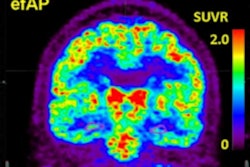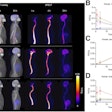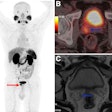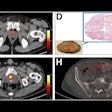
Massachusetts General Hospital (MGH) scientists have developed a molecular imaging radiotracer that identifies Alzheimer's disease-related gamma-secretase in rodents and macaques that has translational potential for humans.
In the new study, Yulong Xu, PhD, and colleagues used recently developed gamma-secretase modulators (GSMs) and synthesized their GSM-based imaging agent, carbon-11 SGSM-15606. After performing molecular imaging in rodents, including Alzheimer's disease transgenic animals and macaques, they found the radiotracer displayed good brain uptake and selectivity, stable metabolism, and appropriate kinetics and distribution for imaging gamma-secretase in the brain (Journal of Experimental Medicine, September 16, 2020).
Alzheimer's disease is characterized by the buildup of amyloid plaques and neurofibrillary tangles in several brain regions. It is believed the beta-amyloid protein, and particularly the beta- amyloid 42 peptide, initiates the disease process. The imbalance between producing amyloid plaques and the inability to clear them leads to brain-cell death and thus Alzheimer's disease. GSMs preferentially reduce beta-amyloid 42 peptide levels by modulating, without totally suppressing, the enzyme's activity.
The PET tracer will "open new avenues for us to better understand the complex puzzle and facilitate drug discovery" in Alzheimer's disease, according to the authors.




















